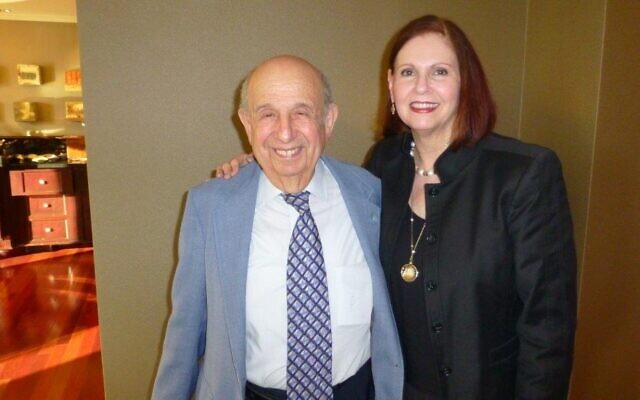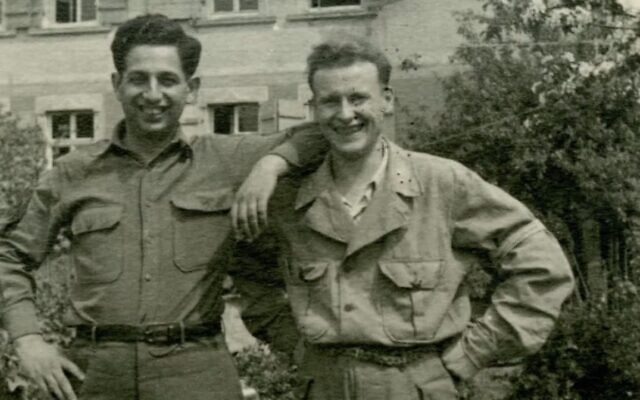Invisible Ink: A Ritchie Boy Speaks
“Ritchie Boy” Guy Stern on his wartime experience and new autobiography.
After reading the recently published article, “Physician Uncovers True Story of Dad’s Heroism,” I would like to offer my commentary as a surviving member of this unique military outfit, nicknamed “the Ritchie Boys.”
As you know, earlier this year, 60 Minutes aired a segment featuring this little-known group of soldiers, including several German-born, Jewish immigrants and their efforts to supply military intelligence during the Second World War. The airing of this episode opened a Pandora’s box of sorts, especially for me, as the media brought to light the contributions of the Ritchie Boys during the war, estimated at over 60% of usable intelligence.
My story is not unlike others. I was born in 1922 in Hildesheim, northern Germany. In 1937, I escaped Germany with the help of an uncle living in St. Louis, Mo. We had hoped that all of my family would be able to immigrate to the United States through my help. Sadly, the bureaucratic handling of my case by an officious lawyer thwarted my family’s passage out of Nazi Germany: They all became victims of the Holocaust. After the bombing of Pearl Harbor, I was convinced that I should enlist in naval intelligence, however, I was denied because I was not an American-born citizen. In less than one year, I was drafted into the United States Army — in 1943 — and naturalized. Because of my language skills and knowledge of German culture, I was selected to be part of the top-secret program, now known as the Ritchie Boys.
I took part in the planning of the Normandy invasion and landed on Omaha D+3. It was my occupation during the war to interrogate German prisoners of war. I interviewed many captured Germans and elicited from them information that would later be used by various headquarters of the American armed forces. Towards the end of the war, I interrogated a Nazi war criminal, a physician, who was in charge of the “euthanasia programs.” I witnessed firsthand the horrors of the Holocaust just days after the liberation of Buchenwald. Occasionally, I was able to utilize my formative experiences as a Ritchie Boy in my university lectures during my post-war career as a Columbia Ph.D., and professor of German and Comparative Literature at various American and German universities. The full story of my journey is detailed in my recently published autobiography, “Invisible Ink” (Wayne State University Press), with a forthcoming German translation by the German writer Susanna Piontek (my wife) to be released mid-January.

After the conclusion of the Second World War, I, like other Ritchie Boys for the most part, kept quiet in deference to the Army recommendation of maintaining silence. We didn’t boast of our efforts. It is not surprising, therefore, that there are many stories of families that did not know the significance of what their loved ones did as Ritchie Boys. Dr. Joseph’s story of finding that his father was part of this select group is not unfamiliar to me. I have received numerous emails and letters in recent years — especially since the airing of the 60 Minutes episode — of people who knew, and others of whom did not know, that their family members were Ritchie Boys. Due to the classified nature of our work during and after the war, we Ritchie Boys were asked to observe silence about our contributions. Now our story is being told; we are no longer relegated to the hidden pages of history. As an example, as recently as 2017, I received recognition in being awarded the title Chevalier de la Légion d’Honneur (French Legion of Honor). It took 72 years for the French government to recognize my — and in a way, OUR — efforts during the war.
I very much enjoyed reading Dr. Joseph’s story; it is a narrative I have heard many times. It is a story that makes me quite proud, to have been part of this select group of intelligence, not for the recent fame we have received, but because we did our part to help make the world safe for democracy.
- Opinion
- Community
- Dr. Guy Stern
- Invisible Ink
- Martha Jo Katz
- Event Site Selection Consultant
- Ritchie Boy
- Dr. Frank Joseph
- Physician Uncovers True Story of Dad’s Heroism
- 60 Minutes
- World War II
- Jewish immigrants
- Hildesheim Germany
- Nazi Germany
- Pearl Harbor
- holocaust
- United States Army
- Normandy Invasion
- liberation of Buchenwald
- Susanna Piontek
- Professor of German and Comparative Literature
- Chevalier de la Légion d’Honneur




comments